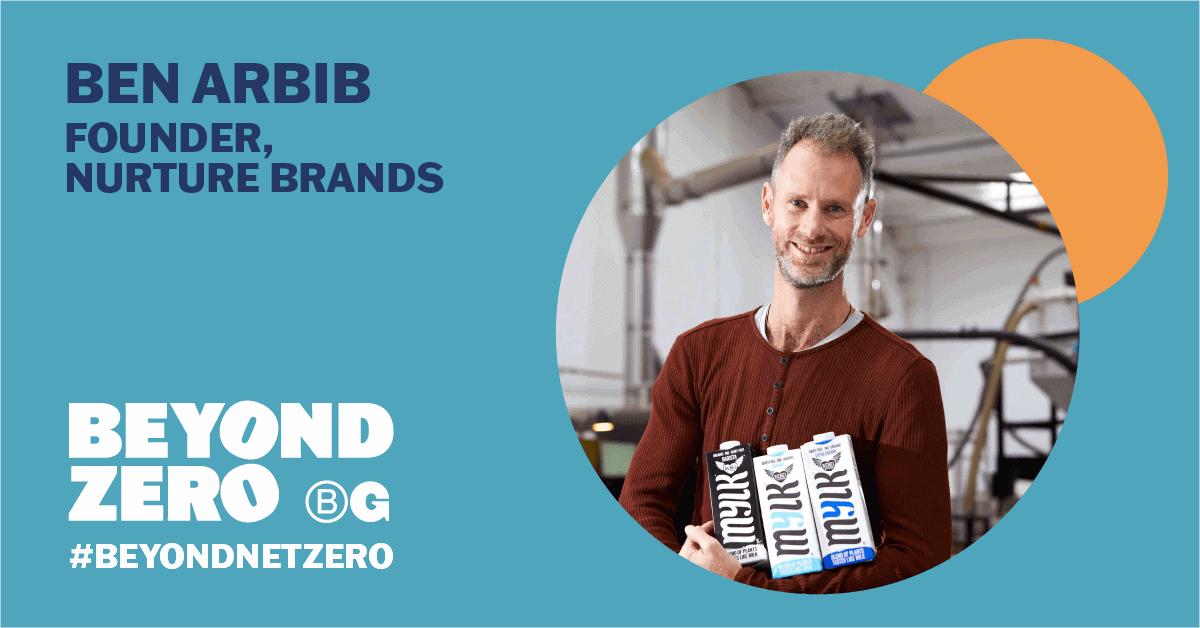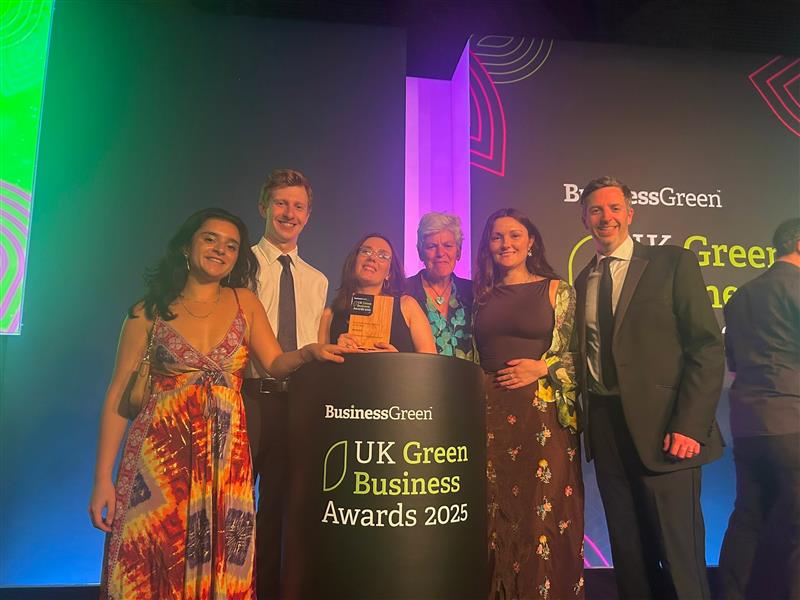Beyond Net Zero Hero: Ben Arbib, Founder of Nurture Brands

“Regenerative organic agriculture has the potential to draw down and sequester huge amounts of carbon while building soil health, capturing water, [growing] more nutritious food and greatly [reducing] our dependence on petrochemical-derived toxic inputs.”
Ben Arbib, Nurture Brands
Congratulations are in order for Nurture Brands: all four of the brands under its umbrella are now certified B Corps. For founder Ben Arbib, this achievement is a significant marker on the journey to being a better business, but it’s certainly not the end goal.
In 2019 the company – which houses vegan brands Emily Crisps, Ape snacks, The Primal Pantry and alternative milk brand Rebel Kitchen, which Ben co-founded in 2014 – set a target to reach net zero within 5 years. “I’d like to have done it quicker. And hopefully we will reach it before five years. But it’s all about being realistic.”
As a food company, Ben says the Nurture Brands team is well aware of the negative impact the agrifood sector has on our environment, and the business is dedicated to bucking this trend. “Were believers in the potential for agriculture to shift this paradigm, and to be a long-term solution to the climate and biodiversity crisis we face.”
This year, Rebel Kitchen is set to launch an insetting regenerative organic farmer training project with its coconut farmers in the Philippines. Instead of offsetting carbon with a third party, the brand is working within its supply chain to reduce carbon footprint. “Soil erosion leads to carbon release, and this will be a major issue in the hilly areas where our coconuts grow, especially with the increasing ferocity of typhoons caused by the warming planet,” explains Ben. “So we’re working collaboratively with farmers to address these and other issues they face.”
Ultimately, it’s purpose rather than profit that drives Nurture Brands’ mission. “We need to be a success to be able to give back more, and that’s the plan,” says Ben. “The bigger we grow, the more profits we generate will get pumped back into doing more good.”
Hear more from Ben Arbib, Founder of Nurture Brands, about how regenerative agriculture can improve the health of our planet, by listening to the full interview:
Jenny Briggs, Greenhouse PR (00:08)
Welcome to the Beyond Net Zero audio series. We are at a critical moment. According to the IPCC, if we are to limit global warming to 1.5 degrees Celsius. It’s essential that we cut net global carbon emissions by 45%, in the next decade, reaching net zero by 2050.
But what if businesses could go one step further, reaching net zero and beyond by 2030? We’ll be interviewing game changing organisations throughout B Corp month to find out how we can create and communicate a net zero future. The B Corp accreditation has huge potential to inspire more businesses to drive positive and meaningful action on climate change. So please tune in and listen to a series of business pioneers leading the way.
Hello, today I’m joined by Net Zero Hero guest Ben from Nurture Brands, a food and beverage company with a big difference, as they strive to nurture more positive choices through food, business and beyond. All of their brands like Rebel Kitchen, Emily, Ape, The Primal Pantry, and Miracle Kitchen are 100% plant based, B Corp certified, carbon neutral and give 1% back to good causes. Welcome, Ben.
Ben Arbib, Nurture Brands (1:37)
Thanks, Jenny. It’s great to be here today. Yes, I’m Ben, the founder of Nurture Brands, I think the introduction you did just gives you a good flavour of what we’re up to. We have four amazing plant based vegan brands that put sustainability and ethics at the core of everything we do, as well as being delicious and tasty as well. But as of last week, actually, all four brands now have achieved B Corp status. I was also Co-founder of Rebel Kitchen seven years ago, and this was something that we aimed to do from pretty much day one, but it does take a few years. So it was a great achievement to get all four brands as as B Corps as well as the mothership, which is Nurture Brands, which is the holding company. We’re also a member of 1% for the Planet, so we get 1% of revenue, that’s revenue, not profits, each year to environmental causes, as well as offsetting our carbon footprint. So yeah, that’s Nurture Brands.
JB (2:42)
Well, well done. I’m so pleased to hear that you’ve managed to reach that goal. I bet that felt like quite an achievement.
BA 2:48
Yeah. So it was, it’s a very detailed audit. So it takes a lot of energy from the whole team. So we had a celebratory zoom call earlier last week.
JB (2:59)
I’m sure you did. Cool. So I wanted to kick off asking, what role do you think the B Corp movement in particular has in the UK achieving and exceeding its net zero targets?
BA (3:12)
Yes, I mean, one of the many things I appreciate about the B Corp movement is its vision for collaboration and its energy to engage the community to work together. And within our individual companies be a force for good. By paving the way of innovation, the movement can be a beacon of inspiration, and action to move us all collectively, within and outside of the movement towards our targets of reaching net zero.
JB (3:36)
Yeah, I completely agree. I’ve had quite a few interviews this week. And collaboration is just a theme that keeps coming up again and again and again. So it’s good to see that you’re reinforcing that there too. And I’d be really interested to know how you’ve approached net zero targets from a company perspective, and how you’re looking to exceed them?
BA (3:57)
Yeah, sure. So back in 2019, we’d set a target to become net zero in five years. We started with measurement, we had to know what our carbon footprint was first, before we could do anything about this, this can be a challenge for an SME, price and complexities can be a barrier for reporting. But thankfully, we found the right partner to support us with this. In 2018, we worked with Carbon Analytics, which is a fellow B Corp to measure, present an historically company wide carbon footprint for Rebel Kitchen. To know our footprint within four years of starting the business felt like a major achievement. Most of the data was in line with our assumptions. As we use third party manufacturers for production the majority of our carbon use is in scope three, a positive surprise for us was we found that our carbon intensity, which is a carbon use as a percentage of revenue, which has averaged actually 35% lower than the food and beverage sector as a whole. So we’re pleased with that.
JB (5:05)
Brilliant, I can see as well, is it’s so interesting that you had that earlier target, so was there a reason why you thought within five years, you want to create that measurement and make a commitment to net zero?
BA (5:18)
Yeah, I mean, I think in in business, you’ve got to be realistic. And that’s something that I felt the team could achieve. I’d like to have done it quicker. And hopefully, we will reach it before five years. But, for me, it’s all about being realistic. So I do believe Nurture Brands will achieve that by the end of 2024. But just going back to it, once we had computed the data, we offset our entire historic carbon use with two incredible, verified carbon projects in Peru, one called Ecosphere and the other managed by PUR Projet, which I think made us one of the first plant based UK companies to take such a step. That was for Rebel Kitchen. And then once Nurture Brands was formed in 2019 we continued to measure and offset all carbon across the portfolio of all four brands. So we’re now certified as net zero.
JB (6:23)
Brilliant. I really love the fact as well, that Rebel Kitchen’s spearheading the way. And then you’re bringing all the other brands on board, and following in your footsteps and that blueprint.
BA (6:36)
Yeah, I mean, obviously, I co founded Rebel. And then when you acquire businesses, obviously you weren’t there from day one. So it’s really sort of infusing the other brands with these sorts of set up, when Rebel was set up back in the day. And again, that just takes time. Hence why you know, even the B Corp certification, took probably 18 months between us creating Nurture and actually gaining the cert.
JB (7:05)
Agreed. And it’s also always a work in progress, which I can see is really coming out is that you’re still working to do more and to do better, which is really good to hear. From your perspective, as I guess an individual and also a business leader, what does a net zero future look like to you?
BA (7:24)
As a food company, we’re well aware of the negative impact the agri food sector has on our environment, which I believe accounts for about 25% of the global greenhouse gas emissions. We’re believers in the potential for agriculture to shift this paradigm, and to be a long term solution to the climate and biodiversity crisis we face. Regenerative organic agriculture does have the potential to draw down and sequester huge amounts of carbon while building soil health, capturing water, growing more nutritious food and greatly reducing our dependence on petrochemical derived toxic inputs.
This year, we’re launching an insetting regenerative organic farmer training project with our coconut farmers in the Philippines for Rebel Kitchen. Essentially, instead of offsetting our carbon with a third party, we’re working within our supply chain to reduce the carbon footprint, as soil erosion leads to carbon release, and this will be a major issue. And the hilly areas where our coconuts grow, especially within increasing ferocity of typhoons caused by the warming planet. So we’re working collaboratively with farmers to address these and other issues they face.
JB (8:41)
That sounds brilliant, I think it’s good as well for you to to explain how you’re working to not just offset but also reduce, and I think that there’s that balance within that zero, that often this term can almost be used as a greenwashing kind of way to explain away emissions, but you’re doing quite the opposite, which is really interesting, and good to hear.
BA (9:06)
Yeah, we’ll always go that extra mile. And hopefully as we grow as a business, you know, we’re still in our infancy, but I’m not really an entrepreneur that’s driven purely by making money. It’s actually about, you know, obviously we need to be at success to be able to give back more and that’s the plan. So, the bigger we grow and the more profits we generate, will just get pumped back into doing more good.
JB (9:40)
No, it’s so inspiring to hear you talk about that kind of continual improvement as a business, which is really good. How do you think the public perceives the term net zero? Do you think that people understand it? Or do you think it’s still a term that is widely misunderstood or people just aren’t aware of it?
BA (10:03)
I think some people understand net zero, I think people understand maybe carbon neutral more than net zero. I think that I hear that around more than net zero, but I’m not sure if companies, I mean, it’s up to the companies and countries to get that level of understanding out there. But I do believe, you know, in the past few years, I’ve definitely seen it be way more mentioned in the media and such.
JB (10:34)
Yeah, I agree. I think it’s growing. There’s definitely growing awareness. And I think you’re right, I think lots of people might be more conscious of what carbon neutral means as opposed to net zero, but I guess it’s an education piece for you to improve on. And looking to the future, what ambitions do you have for Nurture Brands over the next five to 10 years?
BA (10:55)
Well, I suppose, just from a pure business point of view, like I said, we’re still in the infancy, and we believe we’ve got some amazing product lines across the world brands and like anything, it’s about the level of distribution you have, I mean, we’re in the game of selling our products, and we need to kick on and get our products into the mainstream. Right now, I’d say a lot of our brands are mainly undiscovered by by the average consumer and the more products that we can sell to a consumer that may be buying from, let’s say, big food that may not be focusing on on the issues at hand, every sale we can take away from them sort of counts towards a greater good.
But if you’re asking me from more of a environmental point of view, I think over the next five to ten years we’re putting a manifesto together, which again, was drawn from the Rebel Manifesto, which covers five areas, which are a transparent supply chain; supporting regenerative, organic agriculture; reduce, reuse, recycle, reimagine; focus on community, and focus on healthy humans. I mean, I can drill deeper into each of those if you want. But they’re the five main points of our Manifesto, which we’ll be sharing as a Nurture Brands manifesto later this year.
JB (12:35)
There is ‘Reimagine’ that really kind of shone out to me, is that part of the reduce area?
BA (12:42)
Yeah, we want to close the loop on consumption by reimagining the existing model of production.
JB (12:49)
I think that sounds pretty trailblazing to me to close the loop on consumption. And, I think as a food and beverage company, that’s quite different as well to the path that many are on.
BA (13:05)
Yeah, I mean, you know, to go back to the comment, we want to sell more. I mean, I’d love for everyone to be able to be at home and cook from scratch. But you know, we’re a company that understands that we live busy lives, and a lot of our products are for, you know, those impulse moments of the day when you’re out and about. But I suppose the more people that can focus on making things at home, there is going to be a lot less waste and recycling needed.
JB (13:38)
No, I completely agree. Oh, well, thank you so much for joining me today. Ben, it’s been so interesting to hear. I wonder if there’s anything else coming up for Nurture Brands that you wanted to just profile?
BA (13:53)
Yeah, I mean, I think our big exciting product launch this year was a Barista milk for Rebel Kitchen which was over a year in the working, which was basically looking at the plant based dairy space that we’ve been operating in for a number of years and realising that actually, coffee shops, probably in a non COVID-19 era is where most people get introduced to, to the plant based milk world. And there’s a few brands that have obviously been doing amazingly well in that space, and we just felt that there was an opportunity to disrupt that sector. And we spent a year working with James Hoffman, who’s a barista World Champion, and working on basically creating a barista milk that isn’t from a single ingredient source. It’s a blend of plants that tastes like milk. So we’ve done a lot of research and most people coming into the plant based world, they were once dairy drinkers and I think a lot of plant based milks, actually let down people on the fact that you know, dairy has a consistency, a certain taste. And suddenly you come into, you know, let’s say straight almond milk, or even straight oat milk and it just tastes very…it’s a very particular taste and therefore affects if you’re a coffee connoisseur and you’re spending two or three pounds on a cup of coffee, suddenly you’ve ruined your cup of coffee because it’s completely taken you away from the coffee notes that really should be coming through. So we’ve actually been working with James to create the ultimate barista milk, which we just launched in January. Obviously not a great time to launch when not many people are out and about, but it is available on Amazon for anyone that wants to try it. And I’m really excited about that, I back that to probably be Nurture Brand’s biggest product line within the next year or so.
JB (15:56)
Oh, brilliant. Well, I can’t wait to try and experiment with it actually. Thanks for letting me know, Ben, and thanks for joining me.
BA (16:05)
Well, thanks for the invite Jenny. Great to chat.
JB (29:09)
You have been listening to Beyond Net Zero, a campaign celebrating pioneering B Corporations, from Greenhouse PR. Find out more on our website and sign up to our webinar on March 31, with John Elkington, a world authority on corporate responsibility and sustainable development.
Discover more interviews with our Beyond Net Zero Heroes:


